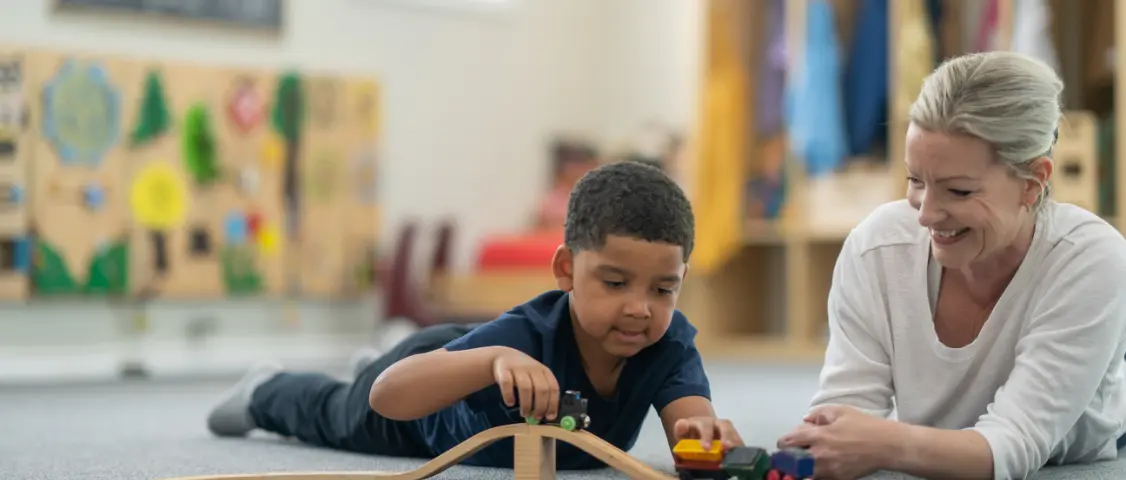Many children struggle to manage their emotions when faced with new or stressful situations, such as starting school, navigating friendships, or dealing with grief. Therapy can play a powerful role in managing these situations by providing effective coping skills to manage stress and turbulent emotions.
Coping skills taught in therapy give children the foundation to understand, express, and manage their thoughts and emotions. Through structured activities, play, and skills training, children learn practical strategies to address difficult emotions, develop positive thinking patterns, foster confidence, and build resilience. These tools not only help with their current issues but also provide long-term strategies to promote emotional well-being and adaptability throughout their lives.
Another area where therapy can be helpful to children is to help them develop social skills. Social skills are a set of behaviors which help children deal with the complex social worlds of home, school, and friendships. Effective social skills come easily for some children; however, some children benefit from therapy to better understand how to respond in complicated social settings. The benefit of helping children with social skills is that they can become more resilient to life’s challenges. Dealing with challenging situations, including peer pressure, becomes less stressful for children and they manage it more effectively.
Why Are Coping Skills Helpful for Children?
Coping skills are strategies or techniques that provide emotional or cognitive equilibrium during difficult or stressful times. Adaptive coping skills are constructive strategies that use support, problem-solving, or emotional regulation to manage stress, while maladaptive coping strategies (such as aggression or avoidance) provide short-term relief from stress but often have negative long-term consequences. In therapy, individuals learn and prioritize adaptive coping and minimize or eliminate maladaptive coping. For the purposes of this article, “coping skills” refer to adaptive coping strategies learned in therapy.
Individuals of all ages can benefit from learning coping strategies to manage stress, but children especially benefit because it provides a foundation for emotional resilience (responding to emotions constructively) and skills that help children throughout their lives. In essence, therapy provides early psychoeducation (knowledge of their mental health) and long-term emotional well-being. Additionally, while therapy is invaluable for helping children who need support with various issues, it’s beneficial for all children because it provides a foundation for long-term emotional health and well-being, equipping children to handle the ups and downs of life and preparing them for life’s challenges.
Types of Coping Skills Children Learn in Therapy
Coping skills operate as a personalized toolbox that children (and adults) can draw from when faced with stressful or challenging situations. These strategies are tailored to fit each child’s level of cognitive and social development and their unique needs and preferences. They recognize that no two children are alike in how they respond to stress. The variety of skills in this “coping toolkit” allows children to choose approaches that resonate best with them in a given moment.
In therapy, therapists work with children to develop a personalized set of coping strategies across several areas that support their emotional, cognitive, behavioral, and social growth. This exposure helps them discover which tools are most effective for different situations, such as anxiety before a test or a disagreement with a friend. With practice, children learn how to handle challenging situations today and gain confidence in their ability to navigate future challenges. In the following sections, we’ll explore specific areas where children learn to cope and various strategies often employed within these areas.
Emotional Coping Skills
For many children, emotions are overwhelming, and it can be challenging to know how to express themselves other than by acting out, withdrawing, or seeking attention. By learning emotional coping skills in therapy, children are able to identify and express their emotions appropriately, manage intense emotions effectively, and become more aware of their triggers and how to prevent stressful situations in the future. These skills equip children with emotional resilience, or the ability to respond to stressful situations while maintaining internal well-being.
Evidence-based emotional coping skills include:
- Identifying and Labeling Emotions: Helping children recognize and name their emotions, especially in response to stress or anxiety. Therapists may:
- Use emotion charts to help children match feelings to facial expressions
- Discussing how and where different emotions feel in the body
- Encouraging children to consistently verbalize their feelings
- Deep Breathing Exercises: Teaching children to manage the autonomic nervous system through breathing, allowing them to directly reduce stress and achieve calm. Therapists may:
- Teach balloon breathing, where children imagine inflating a balloon in their belly.
- Practice 4×4 or “square” breathing, where they inhale, hold, exhale, and hold for four counts each.
- Expressive Activities: Giving children creative outlets to process and express their emotions more effectively, particularly for younger children. Therapists may:
- Encourage drawing or art therapy activities to help children express their feelings
- Encourage children to role-play or act out emotional situations with toys or dolls
- Engage children in music or dance as an emotional expression
Cognitive Coping Skills
Cognitive coping skills primarily provide children with a way to manage thoughts or thought patterns causing them distress, such as negative self-talk, ruminating thoughts, or maladaptive beliefs. Therapists help children identify negative thought patterns, assess their validity and truthfulness, and replace them with realistic and positive thoughts. For example, a child who feels anxious about failing a test might learn to replace thoughts like “There’s no point, I can’t do this” with “I’ve prepared, and I’ll do my best.” This shift in perspective can reduce overall anxiety (by decreasing the presence of negative thinking) and increase self-confidence (by increasing the presence of positive thinking).
Evidence-based cognitive coping skills include:
- Positive Self-Talk: Encouraging children to reframe negative thoughts with more positive and realistic ones, often with positive affirmations or by focusing on their strengths.
- Problem-Solving Skills: Teaching children how to break down problems into manageable steps, helping them approach challenges constructively and objectively.
- Grounding Techniques: Teaching children how to reduce stress and potentially ruminative thoughts by focusing attention on their immediate environment. Grounding techniques help children anchor themselves in the present moment and develop self-awareness, especially body awareness. These techniques also follow under the category of emotional coping skills and can include:
- 5-4-3-2-1 Senses Rule: Name five things you can see, four you can touch, etc., for each of the senses, redirecting focus to one’s body and the present moment.
- 3-3-3 Rule: Identify three things you can see, hear, and feel, similar to the 5-4-3-2-1 rule.
- Body Scan: Focus attention on different parts of the body, starting at the toes and moving upwards, noticing any sensation or tension in each area.
Behavioral and Active Coping Skills
Behavioral and active coping skills involve physical actions that help children manage stress and redirect their energy constructively. These skills are effective because they allow children to express emotions physically or tangibly, which is especially helpful for children who struggle to verbalize their feelings or are potentially hyperactive.
Evidence-based behavioral and active coping skills include:
- Physical Exercise: Encouraging activities like running, jumping, or playing sports, which help release stress and boost mood through endorphins. Additionally, physical exercise allows children to redirect excess emotions or energy and can provide situational confidence for some children.
- Structured Play: Involving activities that encourage problem-solving and emotional expression through play, where children feel the most comfortable engaging and participating in these skills. Popular play activities include board games, building blocks, or puzzles where there is inherent structure and rules but enough flexibility for children to be creative in their approach.
- Sensory Strategies: Providing children with materials or toys to improve sensory processing of their environments can help build awareness and, in some cases, learn tactile strategies to reduce stress. Sensory objects include fidget toys, stress balls, play dough, and kinetic slime, which can promote calming in some children.
Social Coping Skills
Social coping skills help children interact more effectively with others, including reducing loneliness, building support networks, setting boundaries, and learning assertiveness. These skills help children learn how to seek and give support, handle conflicts, and express their needs early on, providing skills that encourage a lifelong network of support and lifelong social well-being.
Evidence-based social coping skills include:
- Non-Verbal Communication: Understanding and using body language, facial expressions, and tone of voice to contextualize how others feel and how to express oneself appropriately.
- Active Listening: Teaching children to focus on what others are saying without interrupting; and empathizing with others’ viewpoints. This helps in the development of the important interpersonal skill of empathy, or being able to put oneself in another person’s shoes, or to understand another person’s perspective.
- Conflict Resolution: Teaching children how to break down issues and problem-solve creative solutions during disagreements or arguments and effectively negotiate with others.
- Asking for Help: Encouraging children to reach out to friends and family when they feel overwhelmed, and helping children understand when they need to ask for help and that it’s okay to do so.
Help Your Child Learn Skills that Last a Lifetime with Start My Wellness
Therapy can empower children with coping skills that promote emotional resilience, improve problem-solving abilities, and enhance their social interactions by providing a toolkit of strategies to apply to life’s challenges. By learning a range of approaches to managing stress, children gain essential tools to not only navigate their current challenges but also to lay the foundation for a lifetime of healthy emotional development.
At Start My Wellness, we understand that each child is unique, and we’re dedicated to providing personalized support that fosters their growth and resilience. Our team of experienced child therapists and counselors is passionate about helping children develop customized coping strategies that fit their individual needs and strengths.
If you’re ready to help your child build lasting skills of emotional well-being, contact us at (248)-514-4955 and meet our therapists. We’re here to support your child’s journey to a brighter, healthier future.
Sources
- Trends in Psychology: Brief Assessment of Adaptive and Maladaptive Coping Strategies
- Start My Wellness: Boosting Children’s Self-Esteem
- Start My Wellness: Understanding Child Therapy
- Mental Health Center Kids: Healthy Coping Skills for Kids
- Start My Wellness: Top 5 Benefits of Counseling for Emotional and Behavioral Issues
- Healthline: 30 Grounding Techniques to Quiet Distressing Thoughts

Author: Anton Babushkin, PhD
Looking for a Therapist? Start My Wellness has highly experienced Licensed Therapists that are currently accepting new patients.


